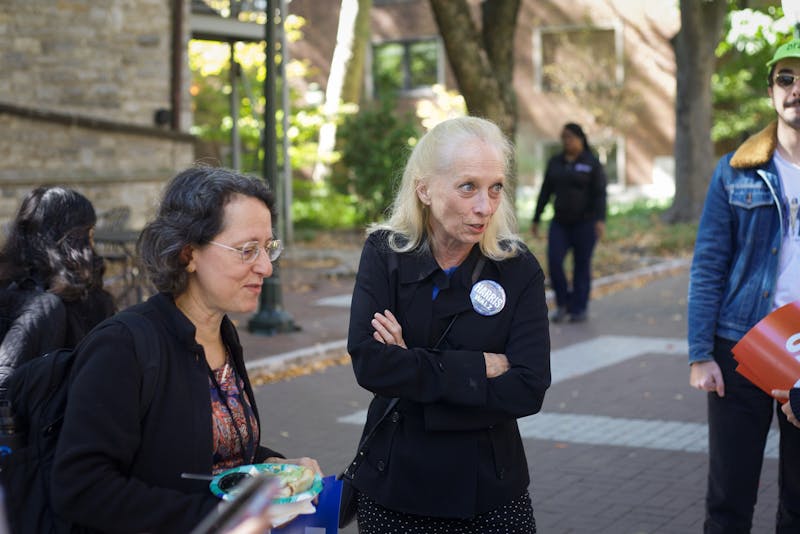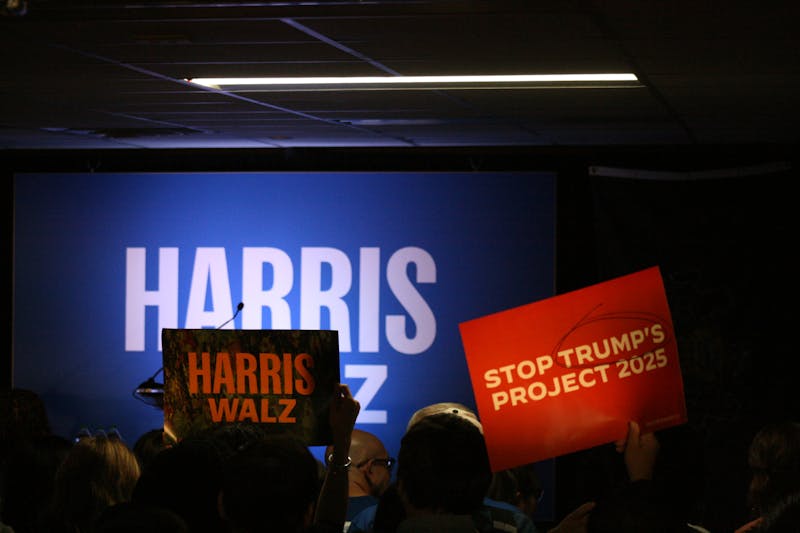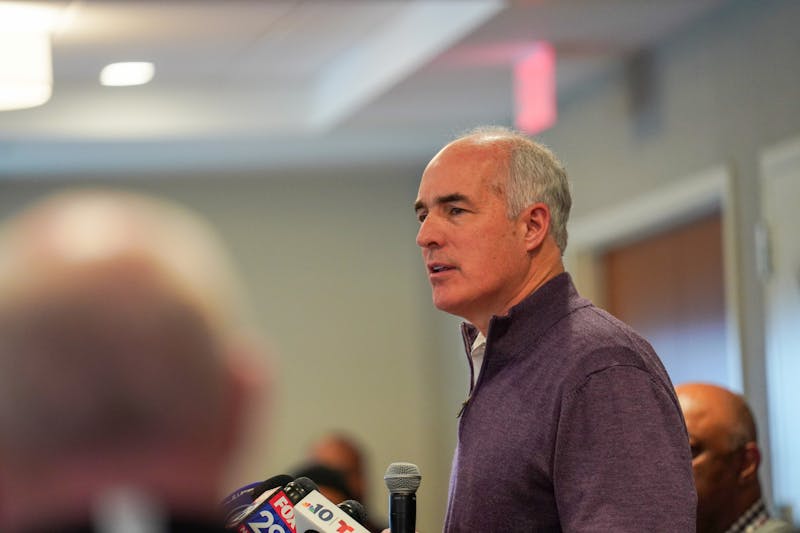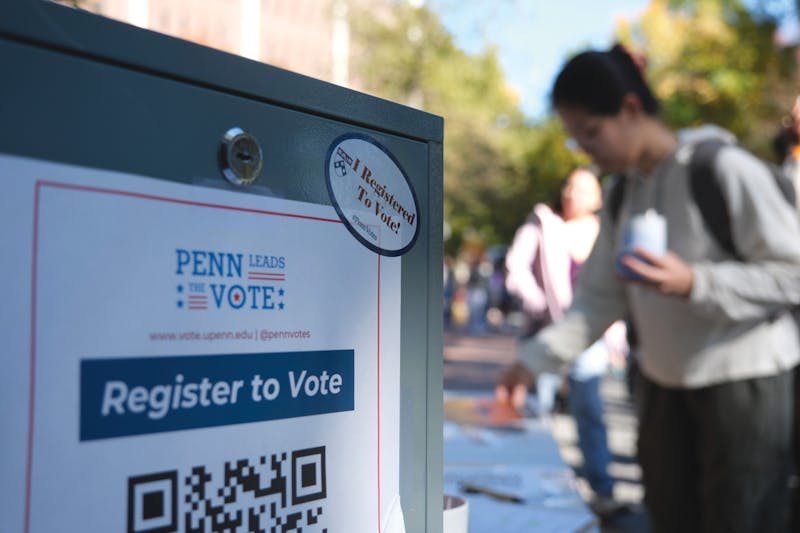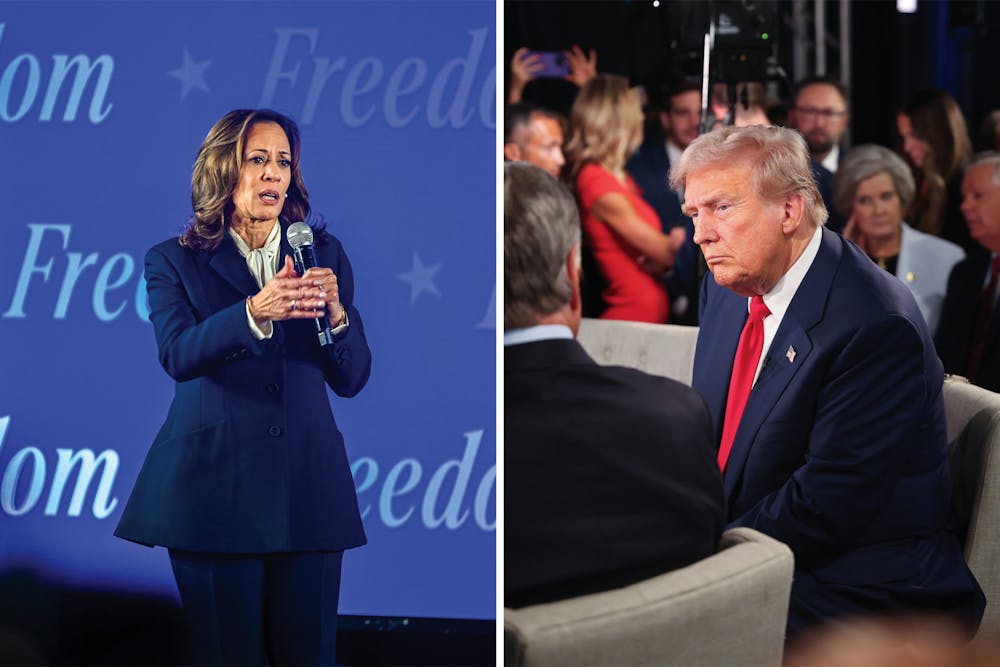
Ahead of Election Day, The Daily Pennsylvanian has compiled a comprehensive ballot guide to all of the candidates — national and local — on the ticket, along with where you can go on campus to vote for them on Tuesday, Nov. 5.
Registering to vote and mail-in ballots
The deadline to register to vote has already passed in Pennsylvania, but voters can check their registration status here.
Applications for a mail-in or absentee ballot are still open and must be received by the voter's county election office by 5 p.m. on Oct. 29. In the case of an emergency, voters may be able to request an emergency absentee ballot.
Mail-in ballots must be received — not simply postmarked — by the county election office on Nov. 5 at 8 p.m. to count.
Polling locations
Voters can cast their ballots on Penn’s campus from 7 a.m. to 8 p.m. on Nov. 5.
Students living in Kings Court English, Lauder, and Hill College Houses, as well as Domus, can vote in ARCH Room 108. Students living in the Quad and Stouffer Hall in Stouffer College House can vote in the Reading Room at Houston Hall.
Students living in Harnwell, Gregory, Harrison, Rodin, Du Bois, and Gutmann College Houses; Mayer Hall in Stouffer College House; and the Axis, the Chestnut, the Radian, Chestnut Hall, Hamilton Court, the Hub on Chestnut, or 3737 Chestnut can vote in Bodek Lounge in Houston Hall.
Students living in The Simon at Founder’s Row can vote at Robeson High School, which is located at 4125 Ludlow St.
Students living in other off-campus housing can check the location of their polling place here.
Races on the ballot
President of the United States
The race for the presidency has drastically changed over the past several months. President Joe Biden, a former Penn professor and the former presumptive Democratic nominee, withdrew from the campaign in late July after his widely criticized performance in the first presidential debate of the cycle. Now, 1968 Wharton graduate and former President Donald Trump is facing Vice President Kamala Harris — the first woman of color to lead a major party ticket — as his Democratic opponent.
Pennsylvania is expected to be critical in determining the victor of the election, and was classified as “the presidential election’s most important state” by The Brookings Institution earlier this month.
Kamala Harris (D)
Harris, who was widely viewed as more socially progressive than Biden prior to receiving the Democratic nomination for president, has since moved toward the political center and aligned herself more closely with Biden’s platforms of advancing climate policy, health care, reproductive rights, and social justice reform. Prior to assuming the vice presidency, Harris served as a U.S. senator from California from 2017 to 2021 and as attorney general of California from 2011 to 2017.
Harris’ running mate is Democrat Minnesota Gov. Tim Walz. Pennsylvania Gov. Josh Shapiro, an ex-officio member of the University Board of Trustees, was also in serious contention for the position.
Penn Democrats endorsed Harris shortly after she announced her candidacy.
Donald Trump (R)
Trump, who graduated from the Wharton School in 1968, is seeking his second term as president after his first from 2016 to 2020. He continues to focus on priorities from his previous administration, such as border security, “America First” trade policies, and economic growth through tax cuts and deregulation. Trump holds conservative stances on immigration, foreign policy, and social issues, positioning himself as a change from what he characterizes as ineffective Biden-era policies.
Trump’s running mate is Sen. J.D. Vance (R-Ohio), who has served in the U.S. Senate since 2023.
Third-party candidates
Environmental lawyer Robert F. Kennedy Jr. was an independent presidential candidate until August, when he suspended his campaign and endorsed Trump. He ran on a platform critical of mainstream media, government institutions, and vaccines. Kennedy does not appear on the ballot in Pennsylvania.
Jill Stein, the Green Party candidate, is known for her focus on climate action, anti-corporate influence, and her stance against the United States’ influence in the Israel-Hamas War. Stein’s running mate is 2004 Penn Ph.D. graduate Butch Ware.
Chase Oliver, the Libertarian Party candidate, is running on a platform of less government interference and market-driven solutions.
United States Senate
The race between Sen. Bob Casey (D-Pa.) and former hedge fund CEO Dave McCormick could determine whether Democrats maintain or Republicans regain their majority in the Senate, which currently consists of 51 Democrats and Democrat-aligned independents and 49 Republicans.
The race is currently classified by the nonpartisan Cook Political Report as a “toss up.”
Bob Casey (D)
A moderate Democrat who has served as a U.S. Senator for Pennsylvania since 2007, Casey — whose family has a longstanding influence in Pennsylvania politics — is campaigning on a platform aimed at supporting the Commonwealth’s working class, affordable health care, Social Security and Medicare, and job opportunities in clean energy. Casey has supported organized labor throughout his time in the Senate.
Casey has made several appeals to young voters while on the campaign trail and mentioned the Penn Wharton Budget Model during a September campaign event.

Dave McCormick (R)
McCormick, a former CEO of Bridgewater Associates and hedge fund manager with a military background, presents himself as a business-savvy candidate who can strengthen Pennsylvania’s economy. He advocates for lower taxes, limited government, and fewer regulations. He has criticized Casey’s alignment with national Democratic policies — particularly around energy regulations, which he argues harm Pennsylvania’s energy sector.
Penn College Republicans and American Conservation Coalition Action hosted an event with McCormick on Oct. 23 near Penn’s campus, focusing on his stances on climate and energy policy.

Pennsylvania Attorney General
The state attorney general is Pennsylvania’s top prosecutor and responsible for enforcing the state’s laws, investigating corruption, and protecting consumers.
Eugene DePasquale (D)
DePasquale, who served as the Pennsylvania auditor general from 2013 to 2021 and in the Pennsylvania House of Representatives previously, currently works as an adjunct professor at the University of Pittsburgh. His campaign is focused on transparency, consumer protection, and environmental protection. In 2020, DePasquale was the Democratic candidate in Pennsylvania’s 10th congressional district against incumbent Rep. Scott Perry (R-Pa.) but ultimately lost the race.
His campaign has emphasized his record on government accountability, work on addressing the opioid crisis, and background in protecting consumers from corporate malfeasance. DePasquale beat out four other competitors for the Democratic nomination.
Dave Sunday (R)
As the current district attorney of York County since 2018, Sunday’s platform includes criminal justice reform, enhancing support for victims of violent crime, and prioritizing public safety. He is experienced with violent crime cases and, in his campaign, highlights his work on issues like the opioid crisis — one of his top priorities — and human trafficking. In 2013, he was appointed a special U.S. attorney for the Middle District of Pennsylvania.
Pennsylvania Auditor General
Malcolm Kenyatta (D)
Kenyatta has represented the 181st district in the Pennsylvania House of Representatives in Philadelphia since 2019. A progressive Democrat, he advocates for greater fiscal responsibility, economic justice, and state accountability. He has been vocal on issues like increasing the minimum wage and expanding public health funding and transparency in government spending. Kenyatta was a Democratic candidate in the 2022 U.S. Senate primary in Pennsylvania, but he lost to current Sen. John Fetterman (D-Pa.).
Tim DeFoor (R)
DeFoor is the incumbent auditor general and has served in the position since 2021. His campaign emphasizes efficiency in government operations, fiscal conservatism, and combating wasteful spending. He is also focused on rooting out fraud and inefficiencies in state agencies. Prior to serving as auditor general, he was the comptroller of Dauphin County.
Pennsylvania State Treasurer
The state treasurer is responsible for investing billions of dollars on behalf of the state. The treasurer pays all of the state’s bills and disburses funds to school districts, state agencies, and more.
Erin McClelland (D)
McClelland, a business consultant with experience in health care and small business management, is focusing on modernizing the state treasury, promoting investment in local communities, and increasing financial literacy among Pennsylvanians. Her approach also emphasizes innovation and investment in infrastructure and education.
McClelland prevailed over state Rep. Ryan Bizzarro (D-Erie) — who was endorsed by the state Democratic party — in a closely contested primary.
Stacy Garrity (R)
The incumbent state treasurer with a military background, Garrity focuses on her record maintaining financial stability and transparency in state finances. She has worked on initiatives to increase transparency for Pennsylvania’s finances and to return unclaimed property, and advocates for conservative fiscal policies.
United States Representative
Dwight Evans (D)
Evans, the unchallenged incumbent, is seeking his fifth term in the U.S. House of Representatives. He previously served for 36 years in the Pennsylvania House of Representatives. He suffered a minor stroke in May, but said it would not impact his long-term ability to carry out his duties as a member of Congress.
Pennsylvania State Senator
Vincent Hughes (D) and Anthony Williams (D)
Penn is represented by two state senators: Vincent Hughes and Anthony Williams. Hughes has served in the state Senate since 1994 and is running unopposed for reelection. Williams, who is also running unopposed for reelection, has served in the state Senate since 1998.
Pennsylvania State Representative
Rick Krajewski (D)
Krajewski, a 2013 Penn Engineering graduate, has served in the state House since 2021 and is running for reelection unopposed. He holds progressive viewpoints on issues like workers’ rights and criminal justice reform. In the spring, Krajewski criticized Penn’s handling of the Gaza Solidarity Encampment.
The Daily Pennsylvanian is an independent, student-run newspaper. Please consider making a donation to support the coverage that shapes the University. Your generosity ensures a future of strong journalism at Penn.
Donate







